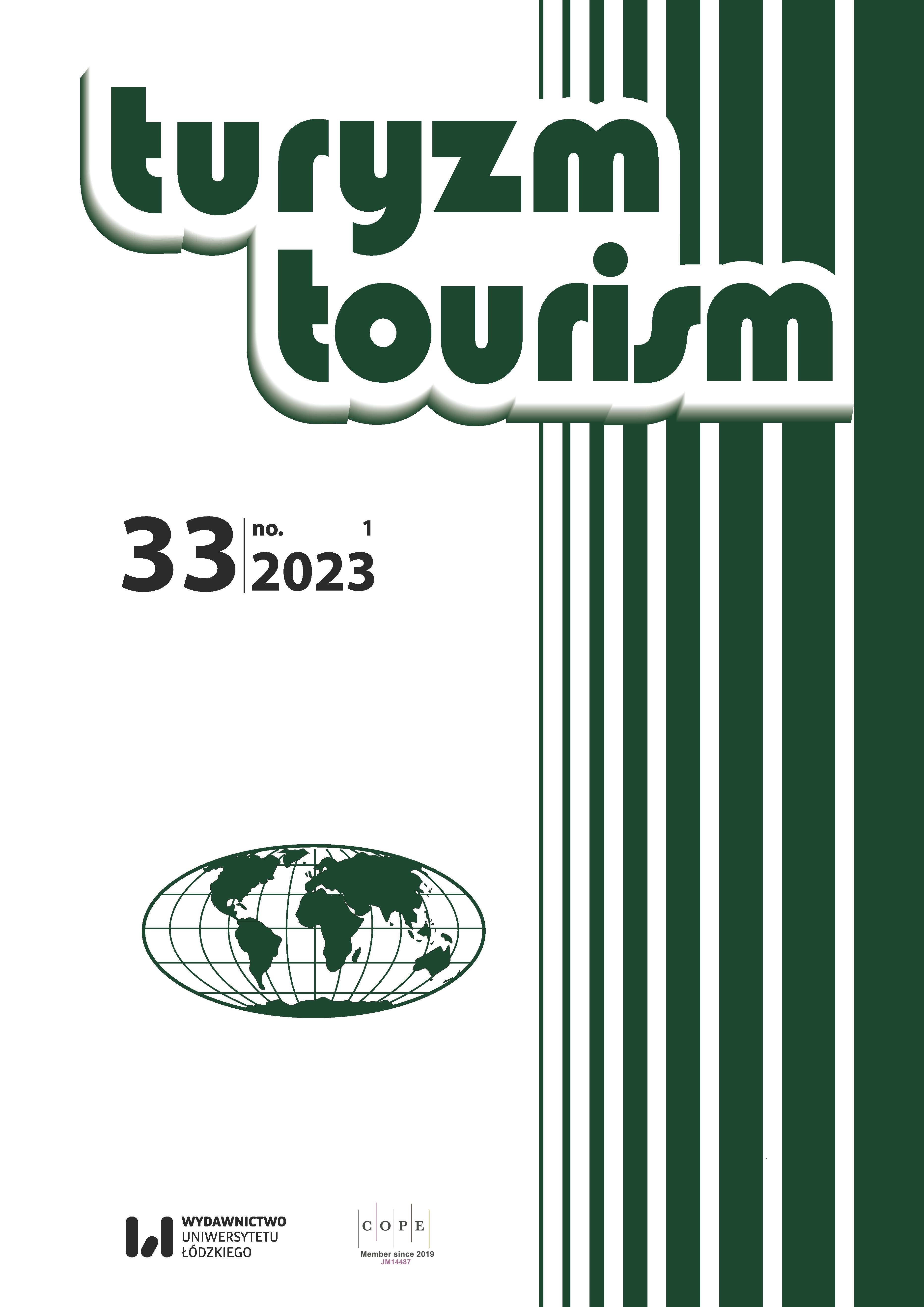Hotel or rented flat: A profile of purchasers of accommodation services in Warsaw
DOI:
https://doi.org/10.18778/0867-5856.33.1.01Keywords:
short-term rental, segmentation, hotel users, short-term rental users, Warsaw tourism market, CHAID decision tree, COVID-19 effects on tourismAbstract
The spreading of short-term flat rentals has brought about changes in the accommodation market, often seen as a threat to traditional accommodation providers. This is particularly true in large cities which have a considerable accommodation capacity and also a large stock of flats. The aim is to indicate to what extent short-term rentals are influencing the tourist accommodation market in Warsaw. The idea behind the study is the assumption that the differences revealed between those using hotels or such flats will provide an answer to the question of the influence of the latter on Warsaw»s tourist market. Such information should be useful in the marketing activities of interested parties and in the policies of the city authorities. Analysis of the data from a survey carried out in 2021 using the CHAID decision tree indicates that the choice of accommodation type was mainly determined by situational variables. The only statistically significant demographic predictor relates to a greater interest in flats among those aged up to 34 years old. Planned expenditure per person per overnight stay proved to be a statistically significant predictor only for non-residents of Poland, with the cut-off amount set higher than the median interval for this segment. Flats were more often chosen by people travelling in a larger party or alone and those planning to stay longer than four nights, thus looking for a different offer than that of traditional city hotels.
Downloads
References
Adamiak, C. (2021). Changes in the global Airbnb offer during the COVID-19 pandemic. Oikonomics [on-line], 15, 1–11. https://doi.org/10.7238/o.n15.2107
Google Scholar
DOI: https://doi.org/10.7238/o.n15.2107
Adamiak, C. (2022). Najem krótkoterminowy w Polsce w czasie pandemii COVID-19. Czasopismo Geograficzne, 93, 9–32. https://doi.org/10.12657/czageo-93-01
Google Scholar
DOI: https://doi.org/10.12657/czageo-93-01
Bae, S.Y., Chang, P.-J. (2021). The effect of coronavirus disease-19 (COVID-19) risk perception on behavioral intention towards ‘untact’ tourism in South Korea during the first wave of the pandemic (March 2020). Current Issues in Tourism, 24(7), 1017–1035. https://doi.org/10.1080/13683500.2020.1798895
Google Scholar
DOI: https://doi.org/10.1080/13683500.2020.1798895
Bagieński, S., Chlebicka, A. (2019). Motywy podróżowania użytkowników platformy internetowej Airbnb. Zeszyty Naukowe. Turystyka i Rekreacja, 2(24), 65–76. http://cejsh.icm.edu.pl/cejsh/element/bwmeta1.element.desklight-1c6b7dee-d94d-4aef-859f-a69ba9b79f29
Google Scholar
Belarmino, A., Koh, Y. (2020). A critical review of research regarding peer-to-peer accommodations. International Journal of Hospitality Management, 84(45), Article 102315. https://doi.org/10.1016/j.ijhm.2019.05.011
Google Scholar
DOI: https://doi.org/10.1016/j.ijhm.2019.05.011
Benítez-Aurioles, B. (2021). How the peer-to-peer market for tourist accommodation has responded to COVID-19. International Journal of Tourism Cities, 8(2), 379–392. https://doi.org/10.1108/IJTC-07-2021-0140
Google Scholar
DOI: https://doi.org/10.1108/IJTC-07-2021-0140
Chen, Y., Huang, Y., Tan, C.H. (2021). Short-term rental and its regulations on the home-sharing platform. Information & Management, 58(3), Article 103322. https://doi.org/10.1016/j.im.2020.103322
Google Scholar
DOI: https://doi.org/10.1016/j.im.2020.103322
Christensen, C., Raynor, M., McDonald, R. (2015). What is disruptive innovation?: Twenty years after the introduction of the theory, we revisit what it does – and doesn’t – explain. Harvard Business Review, 93, 44–53.
Google Scholar
City of Warsaw. (2020). Tourism policy of the City of Warsaw. Retrieved August 20, 2022, from https://wot.waw.pl/wiedza/
Google Scholar
City of Warsaw. (2021). Turystyka w Warszawie w opinii mieszkańców. Raport z badania, wrzesień 2021. [Tourism in residents’ opinion, September 2021]. Retrieved August 2, 2022, from https://wot.waw.pl/wiedza/
Google Scholar
Cocola-Gant, A., Gago, A. (2021). Airbnb, buy-to-let investment and tourism-driven displacement: A case study in Lisbon. Environment and Planning A: Economy and Space, 53(7), 1671–1688. https://doi.org/10.1177/0308518X19869012
Google Scholar
DOI: https://doi.org/10.1177/0308518X19869012
Cocola-Gant, A., Jover, J., Carvalho, L., Chamusca, P. (2021). Corporate hosts: The rise of professional management in the short-term rental industry. Tourism Management Perspectives, 40(4), Article 100879. https://doi.org/10.1016/j.tmp.2021.100879
Google Scholar
DOI: https://doi.org/10.1016/j.tmp.2021.100879
Derek, M., Dycht, K. (2017). Lokalizacja usług noclegowych w otoczeniu Rynku Starego Miasta w Warszawie. Prace Geograficzne, 152, 55–66. https://doi.org/10.4467/20833113PG.17.030.8253
Google Scholar
DOI: https://doi.org/10.4467/20833113PG.17.030.8253
Díaz-Pérez, F., Bethencourt-Cejas, M. (2016). CHAID algorithm as an appropriate analytical method for tourism market segmentation. Journal of Destination Marketing & Management, 5(3), 275–282. https://doi.org/10.1016/j.jdmm.2016.01.006
Google Scholar
DOI: https://doi.org/10.1016/j.jdmm.2016.01.006
Dogru, T., Hanks, L., Mody, M., Suess, C., Sirakaya-Turk, E. (2020a). The effects of Airbnb on hotel performance: Evidence from cities beyond the United States. Tourism Management, 79(26), Article 104090. https://doi.org/10.1016/j.tourman.2020.104090
Google Scholar
DOI: https://doi.org/10.1016/j.tourman.2020.104090
Dogru, T., Hanks, L., Ozdemir, O., Kizildag, M., Ampountolas, A., Demirer, I. (2020b). Does Airbnb have a homogenous impact?: Examining Airbnb’s effect on hotels with different organizational structures. International Journal of Hospitality Management, 86(26), Article 102451. https://doi.org/10.1016/j.ijhm.2020.102451
Google Scholar
DOI: https://doi.org/10.1016/j.ijhm.2020.102451
Dogru, T., Mody, M., Suess, C., Line, N., Bonn, M. (2020c). Airbnb 2.0: Is it a sharing economy platform or a lodging corporation? Tourism Management, 78(4), Article 104049. https://doi.org/10.1016/j.tourman.2019.104049
Google Scholar
DOI: https://doi.org/10.1016/j.tourman.2019.104049
Dolnicar, S. (2008). Market segmentation in tourism. In A.G. Woodside & D. Martin (Eds.), Tourism management: Analysis, behavior and strategy (pp. 129–150). UK: CAB International. https://doi.org/10.1079/9781845933234.0129
Google Scholar
DOI: https://doi.org/10.1079/9781845933234.0129
Dolnicar, S. (2013). Tourism market segmentation – A step by step guide. In C.A. Tisdell (Ed.), Handbook of tourism economics. Analysis, new applications and case studies (pp. 87–104). Singapore, Hackensack (NJ): World Scientific Pub. Co.
Google Scholar
DOI: https://doi.org/10.1142/9789814327084_0004
Dolnicar, S. (2019). A review of research into paid online peerto-peer accommodation: Launching the Annals of Tourism Research Curated Collection on peer-to-peer accommodation. Annals of Tourism Research, 75(37), 248–264. https://doi.org/10.1016/j.annals.2019.02.003
Google Scholar
DOI: https://doi.org/10.1016/j.annals.2019.02.003
Eurostat. (2022). Retrieved September 11, 2022, from https://ec.europa.eu/eurostat/databrowser/view/tour_ce_oan3/default/table?lang=en
Google Scholar
Falk, M.T., Yang, Y. (2021). Hotels benefit from stricter regulations on short-term rentals in European cities. Tourism Economics, 27(7), 1526–1539. https://doi.org/10.1177/1354816620918769
Google Scholar
DOI: https://doi.org/10.1177/1354816620918769
Gutierrez, J., García-Palomares, J.C., Romanillos, G., Salas-Olmedo, M. (2017). The eruption of Airbnb in tourist cities: Comparing spatial patterns of hotels and peer-to-peer accommodation in Barcelona. Tourism Management, 62(2), 278–291. https://doi.org/10.1016/j.tourman.2017.05.003
Google Scholar
DOI: https://doi.org/10.1016/j.tourman.2017.05.003
Guttentag, D.A., Smith, S.L.J. (2017). Assessing Airbnb as a disruptive innovation relative to hotels: Substitution and comparative performance expectations. International Journal of Hospitality Management, 64(1), 1–10. https://doi.org/10.1016/j.ijhm.2017.02.003
Google Scholar
DOI: https://doi.org/10.1016/j.ijhm.2017.02.003
Gyódi, K. (2017). Airbnb and the hotel industry in Warsaw: An example of the sharing economy? Central European Economic Journal, 2(49), 23–34. https://doi.org/10.1515/ceej-2017-0007
Google Scholar
DOI: https://doi.org/10.1515/ceej-2017-0007
Gyódi, K. (2019). Airbnb in European cities: Business as usual or true sharing economy? Journal of Cleaner Production, 221, 536–551. https://doi.org/10.1016/j.jclepro.2019.02.221
Google Scholar
DOI: https://doi.org/10.1016/j.jclepro.2019.02.221
Gyódi, K. (2021). Airbnb and hotels during COVID-19: Different strategies to survive. International Journal of Culture, Tourism and Hospitality Research, 16(1), 168–192. https://doi.org/10.1108/IJCTHR-09-2020-0221
Google Scholar
DOI: https://doi.org/10.1108/IJCTHR-09-2020-0221
Hati, S.R.H., Balqiah, T.E., Hananto, A., Yuliati, E. (2021). A decade of systematic literature review on Airbnb: The sharing economy from a multiple stakeholder perspective. Heliyon, 7(10), Article e08222. https://doi.org/10.1016/j.heliyon.2021.e08222
Google Scholar
DOI: https://doi.org/10.1016/j.heliyon.2021.e08222
Hossain, M. (2020). Sharing economy: A comprehensive literaturę review. International Journal of Hospitality Management, 87(4), Article 102470. https://doi.org/10.1016/j.ijhm.2020.102470
Google Scholar
DOI: https://doi.org/10.1016/j.ijhm.2020.102470
IBM Corporation. (1989, 2012). IBM SPSS Decision Trees 28. Retrieved February 1, 2023, from https://www.google.com/url?sa=i&rct=j&q=&esrc=s&source=web&cd=&cad=rja&uact=8&ved=0CAQQw7AJahcKEwiIuZWK6ov-AhUAAAAAHQAAAAAQAw&url=https%3A%2F%2Fwww.ibm.com%2Fdocs%2FSSLVMB_28.0.0%2Fpdf%2FIBM_SPSS_Decision_Trees.pdf&psig=AOvVaw0iGd-0tw6WeC-2zirAJoh1&ust=1680546599014318
Google Scholar
Jaremen, D.E., Nawrocka, E., Żemła, M. (2020). Externalities of development of the sharing economy in tourism cities. International Journal of Tourism Cities, 6(1), 138–157. https://doi.org/10.1108/IJTC-05-2019-0068
Google Scholar
DOI: https://doi.org/10.1108/IJTC-05-2019-0068
Jiang, N., Law, R., Li, L. (2020). Impacts of peer-to-peer accommodation on the hotel industry: Hoteliers’ perspectives. International Journal of Hospitality Management, 88(6), Article 102516. https://doi.org/10.1016/j.ijhm.2020.102516
Google Scholar
DOI: https://doi.org/10.1016/j.ijhm.2020.102516
Kacprzak, K. (2021). Wpływ pandemii na funkcjonowanie platformy wynajmu krótkoterminowego Airbnb w miastach – przegląd literatury. Konwersatorium Wiedzy o Mieście, 34(6), 41–50. https://doi.org/10.18778/2543-9421.06.04
Google Scholar
DOI: https://doi.org/10.18778/2543-9421.06.04
Kowalczyk-Anioł, J., Pawlusiński, R. (2018). Sharing economy w przestrzeni polskich metropolii i miast turystycznych na przykładzie Airbnb. Konwersatorium Wiedzy o Mieście, 31(3), 15–22. https://doi.org/10.18778/2543-9421.03.02
Google Scholar
DOI: https://doi.org/10.18778/2543-9421.03.02
Legohérel, P., Hsu, C., Daucé, B. (2015). Variety-seeking: Using the CHAID segmentation approach in analyzing the international traveler market. Tourism Management, 46(2), 359–366. https://doi.org/10.1016/j.tourman.2014.07.011
Google Scholar
DOI: https://doi.org/10.1016/j.tourman.2014.07.011
Lutz, C., Newlands, G. (2018). Consumer segmentation within the sharing economy: The case of Airbnb. Journal of Business Research, 88(10), 187–196. https://doi.org/10.1016/j.jbusres.2018.03.019
Google Scholar
DOI: https://doi.org/10.1016/j.jbusres.2018.03.019
Mody, M., Suess, C., Lehto, X. (2019). Using segmentation to compete in the age of the sharing economy: Testing a core-periphery framework. International Journal of Hospitality Management, 78(1), 199–213. https://doi.org/10.1016/j.ijhm.2018.09.003
Google Scholar
DOI: https://doi.org/10.1016/j.ijhm.2018.09.003
Mody, M., Suess, C., Dogru, T. (2021). Does Airbnb impact non-hosting Residents’ quality of life?: Comparing media discourse with empirical evidence. Tourism Management Perspectives, 39(4), Article 100853. https://doi.org/10.1016/j.tmp.2021.100853
Google Scholar
DOI: https://doi.org/10.1016/j.tmp.2021.100853
Pawlicz, A. (2019). Ekonomia współdzielenia na rynku usług hotelarskich: Niedoskonałości, pośrednicy, regulacje. Uniwersytet Szczeciński. Rozprawy i Studia. T. (MCXLI) 1067. Szczecin: Wydawnictwo Naukowe Uniwersytetu Szczecińskiego.
Google Scholar
Pawlicz, A., Prentice, C. (2021). Understanding short-term rental data sources – a variety of second-best solutions. ToSEE – Tourism in Southern and Eastern Europe, 6.
Google Scholar
DOI: https://doi.org/10.20867/tosee.06.39
Prayag, G., Ozanne, L.K. (2018). A systematic review of peer-to-peer (P2P) accommodation sharing research from 2010 to 2016: Progress and prospects from the multi-level perspective. Journal of Hospitality Marketing & Management, 27(6), 649–678. https://doi.org/10.1080/19368623.2018.1429977
Google Scholar
DOI: https://doi.org/10.1080/19368623.2018.1429977
Rabiei-Dastjerdi, H., McArdle, G., Hynes, W. (2022). Which came first, the gentrification or the Airbnb?: Identifying spatial patterns of neighborhood change using Airbnb data. Habitat International, 125(15), Article 102582. https://doi.org/10.1016/j.habitatint.2022.102582
Google Scholar
DOI: https://doi.org/10.1016/j.habitatint.2022.102582
Romano, A. (2021). The shifting geographies of digital intermediation: The effects of the COVID-19 pandemic on shortterm rentals in Italian cities. Digital Geography and Society, 2, Article 100019. https://doi.org/10.1016/j.diggeo.2021.100019
Google Scholar
DOI: https://doi.org/10.1016/j.diggeo.2021.100019
Sainaghi, R. (2020). The current state of academic research into peer-to-peer accommodation platforms. International Journal of Hospitality Management, 89(37), Article 102555. https://doi.org/10.1016/j.ijhm.2020.102555
Google Scholar
DOI: https://doi.org/10.1016/j.ijhm.2020.102555
Sainaghi, R., Baggio, R. (2020a). Clusters of topics and research designs in peer-to-peer accommodation platforms. International Journal of Hospitality Management, 88(2), Article 102393. https://doi.org/10.1016/j.ijhm.2019.102393
Google Scholar
DOI: https://doi.org/10.1016/j.ijhm.2019.102393
Sainaghi, R., Baggio, R. (2020b). Substitution threat between Airbnb and hotels: Myth or reality? Annals of Tourism Research, 83(3), Article 102959. https://doi.org/10.1016/j.annals.2020.102959
Google Scholar
DOI: https://doi.org/10.1016/j.annals.2020.102959
Statistical Office in Warsaw. (2022). Turystyka w m. st. Warszawa. Retrieved September 10, 2022, from https://warszawa.stat.gov.pl/opracowania-biezace/opracowania-sygnalne/kultura-turystyka-sport/turystyka-w-m-st-warszawie-w-2019-r-,3,6.html
Google Scholar
UNWTO. (2010). International recommendations for tourism statistics 2008. Studies in Methods. Series M, 83, rev. 1. New York: United Nations Publication. https://unstats.un.org/unsd/publication/seriesm/seriesm_83rev1e.pdf
Google Scholar
Warsaw Convention Bureau. (2022). Rynek hotelowy. Rynek hotelowy i konferencyjny w Warszawie. Sierpień 2022. Retrieved September 20, 2022, from https://wot.waw.pl/wiedza/
Google Scholar
Yang, Y., Garcia, N., Giampaolo, V., Luis, N.J. (2022). Competitors or Complements: A Meta-analysis of the Effect of Airbnb on Hotel Performance. Journal of Travel Research, 61(7), 1508–1527. https://doi.org/10.1177/00472875211042670
Google Scholar
DOI: https://doi.org/10.1177/00472875211042670
Yeon, J., Song, H.J., Lee, S. (2020). Impact of short-term rental regulation on hotel industry: A difference-in-differences approach. Annals of Tourism Research, 83, Article 102939. https://doi.org/10.1016/j.annals.2020.102939
Google Scholar
DOI: https://doi.org/10.1016/j.annals.2020.102939
Young, C.A., Corsun, D.L., Xie, K.L. (2017). Travelers’ preferences for peer-to-peer (P2P) accommodations and hotels. International Journal of Culture, Tourism and Hospitality Research, 11(4), 465–482. https://doi.org/10.1108/IJCTHR-09-2016-0093
Google Scholar
DOI: https://doi.org/10.1108/IJCTHR-09-2016-0093
Downloads
Published
Versions
- 2023-09-08 (2)
- 2023-04-15 (1)
How to Cite
Issue
Section
License

This work is licensed under a Creative Commons Attribution-NonCommercial-NoDerivatives 4.0 International License.










